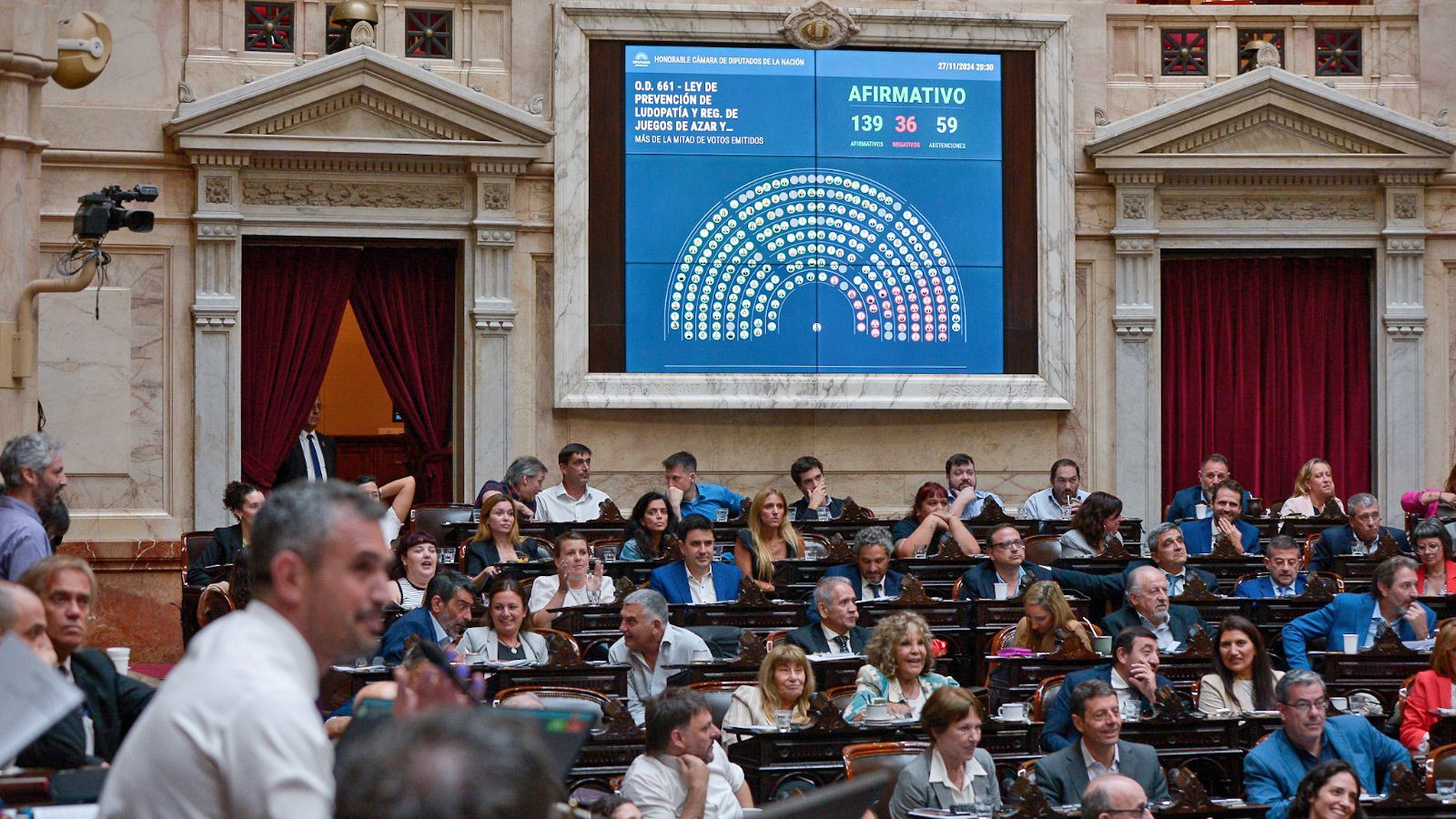Gambling
Argentina: Congress passes legislation to ban online gambling advertising | Yogonet International

The Chamber of Deputies gave a half-sanction on Wednesday, November 27, to legislation aimed at regulating online gambling and preventing gambling among children and adolescents. After a long day of debate, the law was approved by 140 affirmative votes, 36 negative votes, and 59 abstentions. The bill was sent to the Senate.
The 36 negative votes came from the LLA party, and the 59 abstentions from the UCR, PRO, and MID blocks. As for the affirmative votes, there were 140 from Unión por la Patria, Encuentro Federal, Democracia para Siempre, Coalición Cívica, Frente de Izquierda, and Innovación Federal (the board showed 139 votes, but Osvaldo Llancafilo from Neuquén clarified his vote in favor, after failing to register in the system).
In a session that began at noon, two resolutions were debated: one with majority support -supported by the blocks of Unión por la Patria, Encuentro Federal, Coalición Cívica, and FIT- and one with minority support -backed by the blocks of PRO, LLA, and UCR-.
🏛| SESIÓN ESPECIAL
La Cámara de Diputados dió media sanción al proyecto de Prevención de ludopatía y regulación de las ciberapuestas.
Leé más:
👉 https://t.co/oInm6rRuAT#LibertadYDemocracia pic.twitter.com/gFOBM1lzxU
— Diputados Argentina (@DiputadosAR) November 28, 2024
Regarding the resolution with the majority support, Congresswoman Mónica Frade (CC), who chaired all the commission meetings before this debate, pointed out that, although gambling is regulated on a province-by-province basis, the aim is to “give it a national framework and that the provinces may adhere to this regulation.” “We are giving them a tool to fill a legal void they have today,” she said.
Frade stated that “advertising is one of the key issues of the project,” and referred to Article 8 of the project which “prohibits the promotion and sponsorship of gambling, sports betting, and online betting; as well as welcome bonuses and the participation of influencers.” “This is a national, federal, and mental health issue,” she emphasized.
Meanwhile, Deputy Rogelio Iparraguirre (UxP) said that “this vote is a first step.” “It has to be the opportunity to discuss issues that we have postponed such as the context in which new technologies emerge and how they have impacted our lives. Gambling addiction overflowed the kids, but it is a problem of society,” he said.
Maximiliano Ferraro (CC) also added: “Many will come here to object to the issue of jurisdiction and the policing power of this Parliament. Of course, we are very careful with the jurisdictional competence of the provinces, but there is a higher interest and it is a concurrent matter of this Congress of the Nation when establishing minimum budgets or regulatory issues because that is how it was done with tobacco.”
NO VA MÁS: ¡DIPUTADOS LE PUSO UN FRENO A LAS CIBERAPUESTAS!
Hoy logramos la media sanción del proyecto de ley contra la ludopatía y la promoción de las apuestas en línea. Después de cinco meses de trabajo y debate en cinco comisiones, y a pesar de las presiones —tanto solapadas…
— maxi ferraro 🎗️ (@maxiferraro) November 28, 2024
For his part, Christian Castillo (FIT) said: “The structural basis of what has been defined here as a sort of pandemic is a society that denies the future to millions of young children and adolescents.”
It is worth mentioning that the approved bill establishes the modification of Law 26.934, on prevention and comprehensive and interdisciplinary approach to virtual gambling addiction in children and adolescents; a comprehensive plan to address problematic consumption; the prohibition of advertising online gambling games; and the limitation of advertising in professional soccer broadcasting. In addition, it prohibits the access of children and adolescents under 18 years of age to gambling and betting sites and platforms, as well as to online sports betting and predictions.
“We propose to control advertising and regulate it. There are 14.6 million platform users in Argentina: 78% of them use illegal platforms. That is where we should focus, on biometric access so that young people cannot access and on parental control,” he said. However, he warned that the majority opinion should respect local autonomy.
Después de una sesión intensa quedó sancionada la ley para combatir la ciberludopatía infantil y adolescente un flagelo que alcanza a 1 de cada cuatro chicos en nuestro país. Durante meses trabajamos con especialistas y ong’s presentando proyectos para una regulación efectiva 🧵 pic.twitter.com/fNeIPKrSaz
— Silvana Giudici (@SilvanaGiudici) November 28, 2024
Anticipating her vote in opposition, Nadia Márquez (LLA) expressed: “We agree with the prohibition of these games of chance for minors, but we are not going to support the resolution backed by the majority because it does not solve all the problems raised.” Therefore, she proposed to use SEDRONAR’s definition of gambling, to simplify the definition of gambling sites and to reduce the “excessive regulations” of said regulation.
The vote in particular was more complex and took another three hours, but the driving blocks of the project managed to approve all the articles. Among them, a strong and wide prohibition on the advertising of online games is established; biometric verification to access the platforms, so that minors under 18 years of age cannot enter; restrictions on who can operate online games of chance; regulation on the means of payment; educational workshops; and sanctions and reforms to the Penal Code.
Major point of the debate: Advertising
At the time of voting on Article 8, referring to the prohibition of advertising, most of the members of the PRO bloc got up from their benches and left the chamber, generating whistles from the opposition. Later they returned.
Said article, approved by 134 affirmative votes, 32 negative votes, and 24 abstentions, establishes the prohibition of “advertising, promotion and sponsorship of gambling, and online betting” through “platforms and social networks through internet, information and communication technologies, audiovisual communication, outdoor advertising, sports apparel, billboards on public roads or in private spaces of public use, graphic, radio, television, product placement or any other current or future means of communication which, according to technological advances, may be used for the same purposes.”
It also includes the prohibition of “welcome bonuses for gambling and online betting, as well as the sponsorship of sports teams or individual athletes, the use of their trademark or commercial name to identify a sports facility, stadiums, sports academies, recreational centers, public spaces, training centers, the promotion of sports predictions and the placement of fixed or digital signage in playing fields and stadiums. Also its diffusion in festivals or artistic or musical recitals and cultural events in general.”
Finally, the article prohibits “non-traditional advertising (NTP) of gambling and online betting -defined in the Audiovisual Communication Services Law No. 26,522-; indirect or concealed advertising in which mention is made of gambling, sports predictions and betting and online betting through influencers, infocommercial programs and/or the publication, onerous or not, of testimonies of athletes, famous people, figures of public relevance or fictional characters, which mention them.”
Giudici had unsuccessfully requested that the article on advertising be modified to contemplate “what is currently established for tobacco: the prohibition of total advertising by direct or indirect means through all means of diffusion.” Changes proposed by the radical Roxana Reyes were not accepted either.









